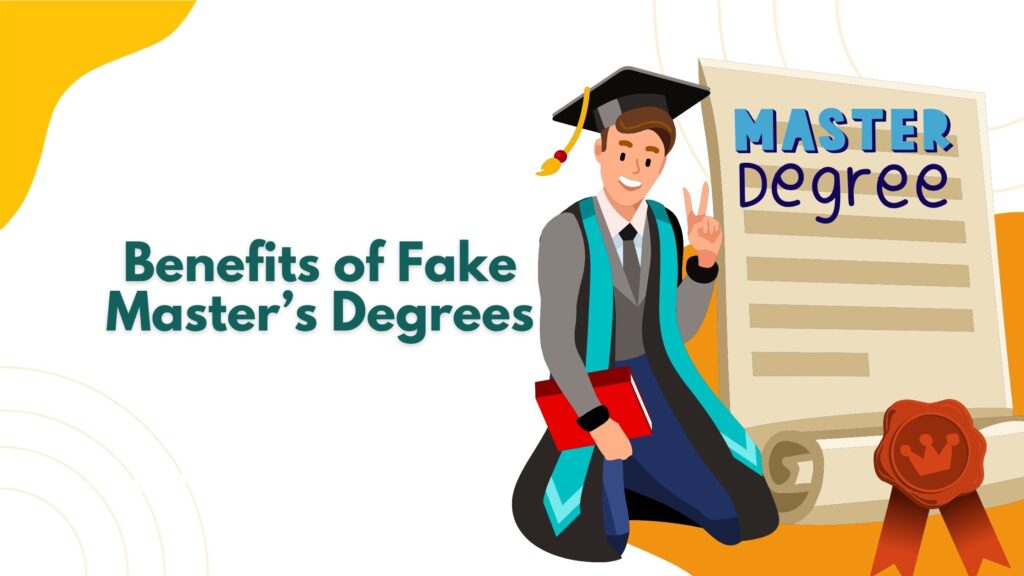
The professional world in 2025 looks very different from a decade ago. With the rise of AI-driven recruitment, digital-first workplaces, and global competition, traditional degrees are no longer the only measure of competence. Many professionals are now exploring unconventional qualifications, including Fake master’s degrees, to stand out in competitive industries and secure better opportunities.
While controversial, these degrees have gained attention for their ability to boost credibility, accelerate career growth, and provide a sense of prestige. Let’s explore the unique advantages of Fake master’s degrees in today’s job market.
1. More Career Doors Open
Finding a good job in 2025 requires more than just skills—it also requires passing through automated application filters. Many companies still use Applicant Tracking Systems (ATS) that prioritize higher qualifications. Having Fake master’s degrees on a resume helps candidates get past these filters and land interviews.
This benefit is especially useful in industries like IT, digital marketing, healthcare administration, and consulting, where qualifications are often seen as proof of dedication. Even though employers value experience, the presence of a master’s title can increase a candidate’s chances of being noticed.
2. Perceived Expertise and Authority
Reputation matters. Professionals holding Fake master’s degrees are often seen as experts in their field. The perception of advanced education builds authority and credibility, which can influence how colleagues, clients, and even competitors view someone.
In sectors that value thought leadership—such as business consulting, public speaking, and entrepreneurship—this perceived expertise can lead to more opportunities, partnerships, and trust from stakeholders. The degree essentially acts as a badge of higher knowledge, even if the path to achieving it was non-traditional.
3. Accelerated Career Growth and Promotions
Climbing the career ladder often depends on both skills and credentials. With Fake master’s degrees, professionals can position themselves for promotions faster. Many organizations still tie leadership roles to higher qualifications, and employees with a master’s degree—real or not—are often shortlisted for managerial or strategic positions.
This advantage is particularly useful in competitive corporate environments, where employees must constantly prove their readiness for higher responsibilities. By signaling ambition and advanced learning, these degrees can help professionals achieve career growth much earlier than expected.
4. Social Prestige and Professional Image
Education has always been linked to prestige. In 2025, with social media platforms showcasing career achievements, the importance of image has only grown stronger. Having Fake master’s degrees can enhance both professional and social standing.
Colleagues may treat degree-holders with greater respect, and industry peers may perceive them as more capable. This recognition often leads to more networking invitations, collaborations, and access to professional circles where new business opportunities arise.
5. Flexible, Affordable, and Time-Saving
Traditional master’s programs require years of study and large financial investments. By contrast, Fake master’s degrees offer a low-cost, time-saving alternative for those who want recognition without the heavy burden of tuition and time away from work.
For working professionals who cannot take career breaks, these degrees provide a way to enjoy the benefits of advanced qualifications while continuing to earn and grow. The flexibility makes them especially appealing in today’s fast-paced economy, where time is often more valuable than money.
6. Confidence and Personal Motivation
Beyond external benefits, Fake master’s degrees also bring personal advantages. Holding an advanced qualification can boost self-confidence, making professionals more assertive in meetings, negotiations, and decision-making.
This sense of achievement, even if unconventional, often motivates individuals to take bigger risks, launch startups, or pursue leadership roles. Confidence is a powerful tool in career success, and these degrees can provide the psychological edge needed to move forward.
7. Keeping Up with 2025’s Competitive Landscape
The global job market in 2025 is shaped by rapid technological change, remote work, and cross-border competition. In this environment, standing out is more difficult than ever. Fake master’s degrees offer a shortcut for professionals who want to keep pace with rising expectations and changing job demands.
They provide a way to demonstrate adaptability, ambition, and readiness to thrive in modern industries where innovation and credentials go hand in hand.
Final Word in 2025
While traditional education continues to hold value, alternative qualifications are reshaping the career landscape. Fake master’s degrees have emerged as an unconventional yet effective option for professionals seeking career growth, recognition, and confidence.
They provide wider job opportunities, create the perception of expertise, accelerate promotions, enhance social status, save time and money, and build self-belief. In today’s fast-moving world, where success is defined by adaptability and results, Fake master’s degrees serve as a modern shortcut to recognition and opportunity.






